|
|
|
Sort Order |
|
|
|
Items / Page
|
|
|
|
|
|
|
| Srl | Item |
| 1 |
ID:
120061
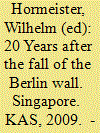

|
|
|
|
|
| Publication |
Singapore, KAS, 2009.
|
| Description |
147p.Pbk
|
| Series |
Panorama Insights into South East Asian and European Affairs
|
|
|
|
|
|
|
|
|
|
|
|
Copies: C:1/I:0,R:0,Q:0
Circulation
| Accession# | Call# | Current Location | Status | Policy | Location |
| 057218 | 943.087/HOR 057218 | Main | On Shelf | General | |
|
|
|
|
| 2 |
ID:
086511
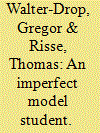

|
|
|
|
|
| Publication |
2009.
|
| Summary/Abstract |
Twenty years after the fall of the Iron Curtain, it is time to take stock. Have expectations been fulfilled? Not entirely. There are three areas where Europe has clearly lagged: bridging the continent's divisions; establishing a veritable common foreign policy; and fostering a sense of legitimacy for the project of European integration.
|
|
|
|
|
|
|
|
|
|
|
|
|
|
|
|
| 3 |
ID:
121612
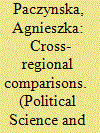

|
|
|
|
|
| Publication |
2013.
|
| Summary/Abstract |
The Arab uprisings, like the fall of the Berlin Wall more than two decades ago, are watershed events that have raised fundamental questions about our understanding of the processes of political change, the emergence and diffusion of contentious collective action, and the role of the international context in facilitating or hindering political change. The uprisings have further strengthened a growing focus within Middle Eastern studies on framing questions about the social, economic, and political dynamics in the region in ways that allow for more robust linkages with comparative theorizing about the dynamics of contentious collective action and the processes of political change. In other words, the Arab uprisings have injected new energy into the comparative study of contentious politics. In addition to new research agendas the uprisings have also provided opportunities for introducing students in survey and theory courses to the region's political dynamics, enriching students' engagement with theoretical concepts and honing their critical thinking and analytical skills while making the Middle East less "exceptional" for the students. Here, I focus on how incorporating of Middle Eastern cases allows instructors to raise questions and engage students in discussions about the emergence and diffusion of contentious collective action.
|
|
|
|
|
|
|
|
|
|
|
|
|
|
|
|
| 4 |
ID:
127920
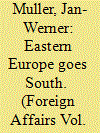

|
|
|
|
|
| Publication |
2014.
|
| Summary/Abstract |
Europeans love to celebrate anniversaries, especially those commemorating a terrible past overcome. This year will offer many such moments, marking as it will 100 years since the outbreak of World War I, 75 years since the beginning of World War II, and, most uplifting of all, a quarter century since the fall of the Berlin Wall. Such milestones are bound to make everyone feel good about European unity.
|
|
|
|
|
|
|
|
|
|
|
|
|
|
|
|
| 5 |
ID:
155025
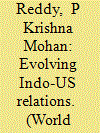

|
|
|
|
|
| Summary/Abstract |
Indo–US relations had their ups and downs during the period 1947–71 and Cold War compulsions added to the differences. After the collapse of the Berlin Wall, successive Indian prime ministers have played a critical role in building and improving ties in a new world order under complex circumstances affecting international relations. P Krishna Mohan Reddy surveys the nature and progress of Indo–US relations under the National Democratic Alliance II.
|
|
|
|
|
|
|
|
|
|
|
|
|
|
|
|
| 6 |
ID:
095627
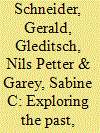

|
|
|
| 7 |
ID:
097676
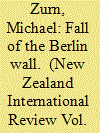

|
|
|
| 8 |
ID:
119661
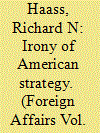

|
|
|
|
|
| Publication |
2013.
|
| Summary/Abstract |
A decade ago, when the wars in Afghanistan and Iraq began, the United States chose to immerse itself in the greater Middle East when it had little reason to dive in. But now that most Americans want little to do with the region, U.S. officials are finding it difficult to turn away.
|
|
|
|
|
|
|
|
|
|
|
|
|
|
|
|
| 9 |
ID:
119901
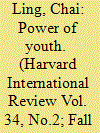

|
|
|
|
|
| Publication |
2012.
|
| Summary/Abstract |
On June 4, 1989, I fled through the streets of Beijing as government officials crushed the student movement we had so passionately held in Tiananmen Square. It was soon reported that our earnest attempt to have peaceful dialogue with our nation's leaders had been a total failure, though some still say otherwise. For 10 months, I hid underground in China, running for my life from those who should have protected us.
|
|
|
|
|
|
|
|
|
|
|
|
|
|
|
|
| 10 |
ID:
095901
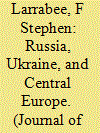

|
|
|
|
|
| Publication |
2010.
|
| Summary/Abstract |
Nine November 2009, marked the 20th anniversary of the fall of the Berlin Wall, effectively marking the end of the Cold War. It opened the way to the collapse of communism in Eastern Europe, the reunification of Germany, the disintegration of the Soviet Union, and the emergence of a new security order in Europe.
|
|
|
|
|
|
|
|
|
|
|
|
|
|
|
|
| 11 |
ID:
129211
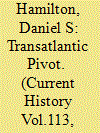

|
|
|
|
|
| Publication |
2014.
|
| Summary/Abstract |
A quarter century after the fall of the Berlin Wall, relations between the United States and Europe have evolved from a single-minded focus on stabilizing the European continent into more diffuse security, economic, and diplomatic agendas encompassing three broad elements. The first is ensuring the continued
vitality of the transatlantic alliance while taming the turbulent spaces of wider Europe. The second is guaranteeing mutual economic recovery while harnessing deep integration to create jobs and fuel growth, and also repositioning Europe and the United States for a world of emerging economies. The third is addressing a range of regional and global challenges, from energy security and nonproliferation to Middle Eastern turmoil and uncertain Asian dynamics.
|
|
|
|
|
|
|
|
|
|
|
|
|
|
|
|
| 12 |
ID:
113134
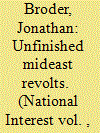

|
|
|
| 13 |
ID:
129486
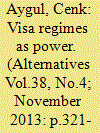

|
|
|
|
|
| Publication |
2013.
|
| Summary/Abstract |
This article examines the significance of labor mobility for capitalism and analyzes the visa regimes of the European Union (EU) and Turkey. After the fall of the Berlin Wall, labor mobility originating from Eastern Europe has been redirected to the West, taking the form of circular migrations and replacing the previous rotation system. While the new forms of circular mobility created insecure employment conditions for many people, it also required a visa regime to classify people when they arrive at the borders. Both nation-states and supranational organizations such as the EU continue to build regulatory capacities. The second half of the article examines the Schengen agreement and the ways in which French German sensitivities were "communitized." While other East European countries chose to be a part of the Schengen agreement's restrictive visa policies, this option was not possible for Turkey, which established a fully liberal regime.
|
|
|
|
|
|
|
|
|
|
|
|
|
|
|
|
| 14 |
ID:
110101
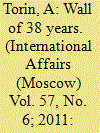

|
|
|
|
|
| Publication |
2011.
|
| Summary/Abstract |
NO OTHER EVENT has had more impact on modern European history than the Berlin Crisis of 1958-1961. Its culmination was the construction on August 13, 1961, of the famous Berlin Wall that divided East and West Germany and consolidated once and for all the existence of two German states - the Federal Republic of Germany and the German Democratic Republic.
The border between East and West Berlin had remained open until August 13, 1961. The dividing line measuring 44.75 kilometers (the total length of the border between West Berlin and East Germany was 164 km) passed directly through streets, houses, canals, and watercourses. Officially, there were 81 street crossing points and 13 passageways in the subway and on the city railroad. In addition, there were hundreds of illegal routes. Every day, between 300,000 and 500,000 people crossed the border between the two parts of the city for different reasons.1 The lack of a clear-cut physical boundary between sectors led to frequent conflicts and the mass departure of specialists to West Germany. East Germans preferred to get an education in the GDR, where it was free of charge, yet work in West Germany.
|
|
|
|
|
|
|
|
|
|
|
|
|
|
|
|
| 15 |
ID:
053322
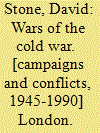

|
|
|
|
|
| Publication |
London, Brassey's, 2004.
|
| Description |
336p.Hbk
|
| Standard Number |
1857533429
|
|
|
|
|
|
|
|
|
|
|
|
Copies: C:1/I:0,R:0,Q:0
Circulation
| Accession# | Call# | Current Location | Status | Policy | Location |
| 048429 | 909.824/STO 048429 | Main | On Shelf | General | |
|
|
|
|
|
|
|
|
|